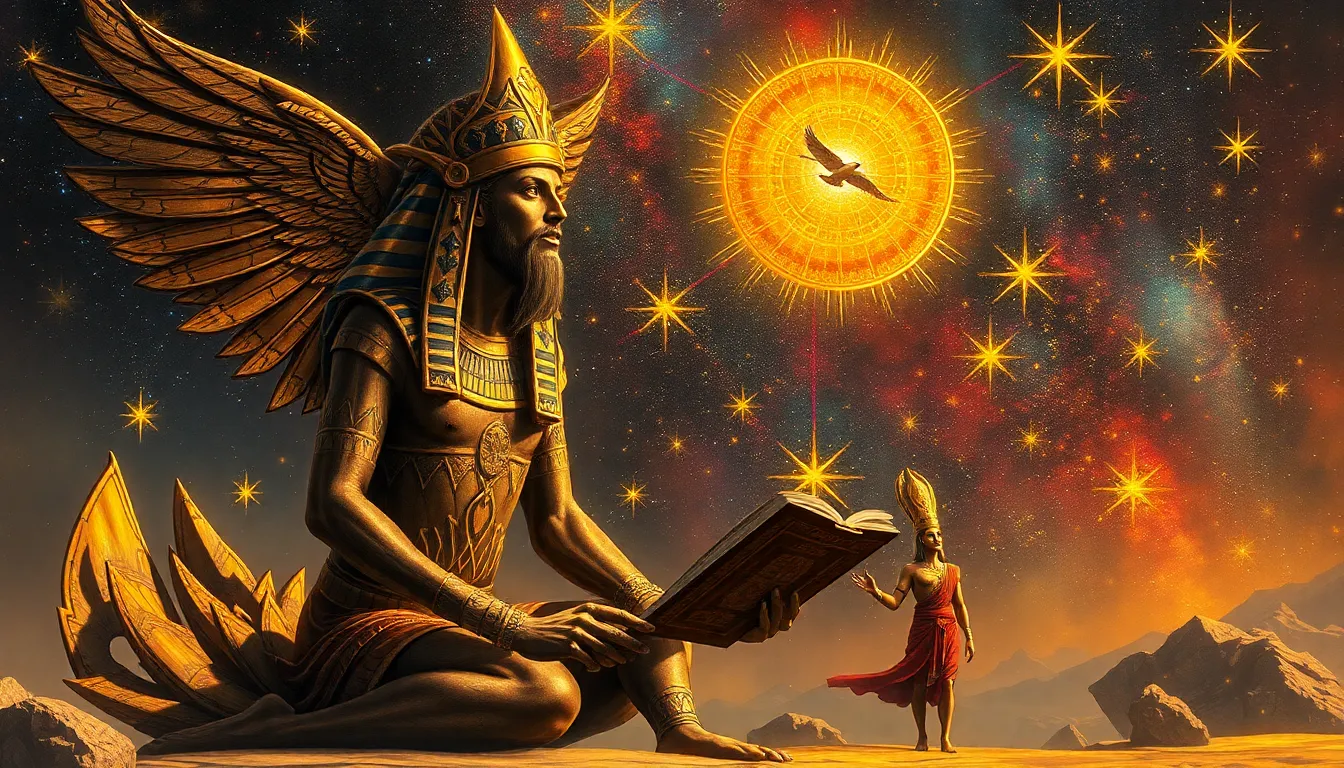The Myth of the Celestial Scribe: Thoth and the Stars
I. Introduction
In the rich tapestry of Egyptian mythology, Thoth stands out as a pivotal figure revered for his intellect, wisdom, and connection to the cosmos. Known primarily as the god of writing, knowledge, and the moon, Thoth’s influence transcends mere literacy; he embodies the essence of order and balance in the universe. The concept of celestial scribes, depicted as divine beings recording the fates and actions of mortals and deities alike, is significant in understanding the cosmic order of ancient Egyptian belief systems.
This article aims to explore Thoth’s intricate relationship with the stars, illuminating his role as a celestial scribe and the profound impact he had on Egyptian culture and mythology.
II. Who is Thoth?
Thoth, often depicted with the head of an ibis or a baboon, is one of the most important deities in ancient Egyptian mythology. His historical background is rich, with roots tracing back to the early dynastic periods. Thoth was revered as a creator god, a mediator, and a divine scribe who recorded the deeds of gods and humans.
Some key attributes and symbols associated with Thoth include:
- Ibis: His primary animal representation, symbolizing wisdom and the power of communication.
- Writing Tools: Often shown holding a reed pen and a palette, emphasizing his role in writing and record-keeping.
- Moon: Thoth is frequently connected to the moon, representing time, cycles, and the passage of knowledge.
In Egyptian culture, Thoth was not only a god of writing but also a deity who governed wisdom, magic, and the arts of calculation, making him integral to the functioning of society.
III. The Celestial Scribe: Thoth’s Role in the Universe
The concept of a celestial scribe is rooted in the belief that certain deities maintain cosmic order through the recording of events and the enforcement of laws. Thoth’s responsibilities extended beyond mere record-keeping; he was a vital force in upholding Ma’at, the principle of truth and justice.
Thoth’s connection to other deities and cosmic entities is evident in various myths. He often acted as a mediator between gods and humans, ensuring that the balance of the universe was maintained. His role included:
- Recording the outcomes of the judgment of souls in the afterlife.
- Assisting in the creation of the world through his wisdom.
- Guiding the sun god Ra through the night, as he was believed to control the passage of time.
IV. Thoth and the Stars: Astrological Significance
Thoth’s influence extended into the realm of astrology in ancient Egypt. He was believed to hold the keys to understanding the movements of celestial bodies and their implications for human affairs. Ancient Egyptians viewed the stars as manifestations of divine will, and Thoth played a crucial role in interpreting these celestial signs.
Some of the ways Thoth’s writings reflected astrological significance include:
- Interpretation of celestial bodies: Thoth was credited with explaining the significance of stars and planets in relation to human destiny.
- Influence on Egyptian calendars: The Egyptian lunar calendar, which relied heavily on the moon’s phases, was attributed to Thoth’s guidance.
- Timekeeping: Thoth’s association with the moon also made him pivotal in the measurement of time, linking the cosmic order to earthly events.
V. Myths and Legends Surrounding Thoth
Thoth is central to several key myths that highlight his wisdom and his interactions with other gods. One of the most famous stories involves the conflict between Horus and Set, where Thoth serves as a mediator, ensuring justice is upheld.
Additional myths include:
- Thoth and the Creation of the World: Some legends depict Thoth as a creator deity who used his wisdom to shape the cosmos.
- The Judgment of Souls: Thoth recorded the results of the weighing of the heart ceremony, a pivotal moment in the afterlife judgment process.
- Thoth and the Moon: Various myths explore Thoth’s relationship with the moon, including tales of his battles against darkness.
Through these stories, Thoth’s role as a keeper of knowledge and a protector of truth is vividly illustrated.
VI. Thoth’s Influence on Later Cultures
The attributes of Thoth were not confined to Egyptian culture; they were adopted and adapted by later civilizations. In Greco-Roman culture, Thoth was equated with Hermes, the messenger god, highlighting his role as a god of communication and intellect.
The impact of Thoth can also be seen in:
- Mystical and esoteric traditions: Thoth’s associations with wisdom and the written word influenced various schools of thought, including alchemy and astrology.
- Modern astrology: Thoth’s principles can still be found in contemporary astrological practices, where the alignment of stars and planets is believed to affect human life.
VII. Debunking the Myths: Historical vs. Cultural Interpretations
Over time, Thoth’s persona has evolved, leading to a blend of historical facts and cultural interpretations. While some myths have been embellished, the core attributes of Thoth as a wise and just deity remain significant.
In examining the myths surrounding Thoth, it is essential to differentiate between:
- Historical context: Understanding the social and political climate of ancient Egypt helps clarify Thoth’s role.
- Cultural interpretations: Different eras and cultures have reinterpreted Thoth’s significance, often reflecting contemporary beliefs and values.
This nuanced understanding is vital for grasping the enduring importance of Thoth in the pantheon of ancient deities.
VIII. Conclusion
Thoth, the celestial scribe of the ancient Egyptians, embodies the intricate connection between knowledge, wisdom, and the cosmos. His role as a recorder of events and a mediator of cosmic order highlights his significance in both mythology and culture.
As we reflect on Thoth’s enduring legacy, it becomes clear that understanding ancient deities like him provides valuable insights into the foundational beliefs that shaped human civilization. The reverence for Thoth, as a keeper of secrets and an interpreter of the stars, remains relevant in contemporary society, inviting us to explore the depths of knowledge and the mysteries of the universe.




